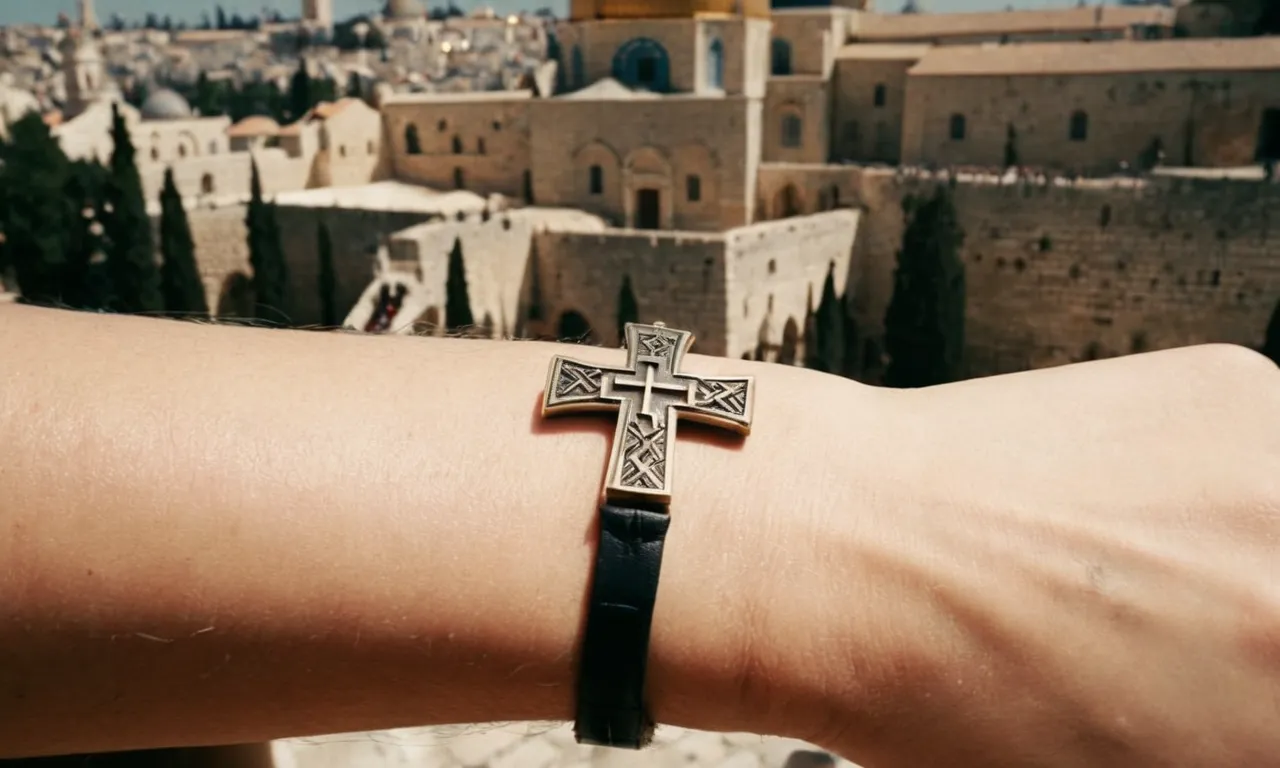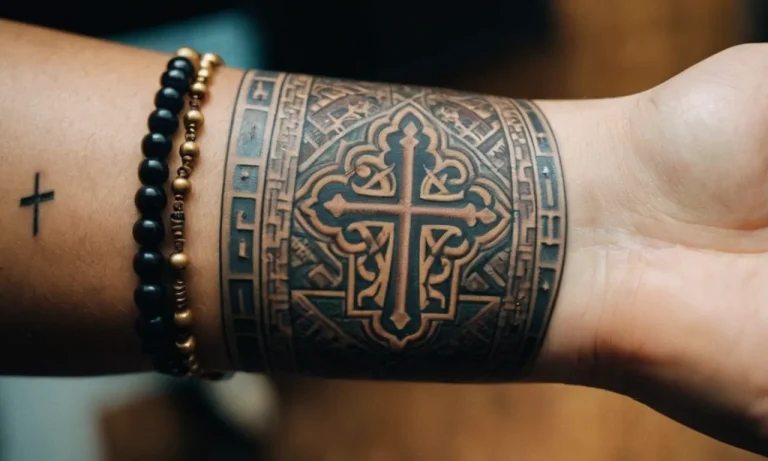What Does The Bible Say About Wearing A Cross?
Crosses have been a prominent symbol of Christianity for centuries. But does the Bible specifically encourage or prohibit wearing cross necklaces and other cross jewelry? The answer is more nuanced than a simple yes or no.
If you’re short on time, here’s a quick answer to your question: The Bible does not explicitly prohibit or command the wearing of crosses, but some verses suggest that outward symbols are less important than internal faith. There are also differences in how crosses are viewed across denominations.
In this comprehensive article, we will explore the main Bible passages about cross symbols, arguments for and against wearing crosses, and what different Christian groups believe about cross jewelry.
We aim to provide an in-depth, non-biased look at the biblical evidence on this question.
Old Testament Verses About Idolatry and Symbols
The Second Commandment
The Second Commandment in the Bible prohibits idolatry and the worship of images. It states, “You shall not make for yourself a carved image, or any likeness of anything that is in heaven above, or that is in the earth beneath, or that is in the water under the earth.
You shall not bow down to them or serve them, for I the Lord your God am a jealous God” (Exodus 20:4-5). This commandment forbids the creation and worship of idols, images, and false gods.
Making idols or images to worship as gods was a common practice in ancient Near Eastern religions, but God expressly forbids it for the Israelites.
Later passages in the Old Testament elaborate further on the prohibition against idols.
For example, Deuteronomy 4:15-18 emphasizes that because the Israelites did not see any form when God spoke to them, they should not make an idol or image to represent God.
The prophets Isaiah and Jeremiah also contain passages railing against idolatry and those who would craft images out of wood, stone, or precious metals to worship as gods (Isaiah 40:19-20, Jeremiah 10:1-16).
The consistent message throughout the Old Testament is that idols are empty, worthless creations of human hands that cannot save, but the Lord is the only true and living God worthy of worship.
Passages from Isaiah and Jeremiah
The prophets Isaiah and Jeremiah contain some of the strongest polemics against idolatry in the Old Testament.
For example, Isaiah 40:19-20 mocks the absurdity of worshiping idols: “As for the idol, a craftsman casts it, and a goldsmith overlays it with gold and fashions silver chains for it.
A person too poor to present such an offering selects wood that will not rot; they look for a skilled worker to set up an idol that will not topple.”
The prophet points out the ridiculousness of worshiping an object made by human hands from perishable materials.
Similarly, Jeremiah 10:1-16 contains a scathing indictment of idolatry. Jeremiah warns the people not to “learn the ways of the nations or be terrified by signs in the heavens, though the nations are terrified by them” (v. 2).
New Testament Verses About the Cross of Jesus
Jesus’ Crucifixion
The crucifixion of Jesus is one of the most significant events in the Bible and in human history. All four Gospels give detailed accounts of Jesus’ arrest, trial, suffering, and death by crucifixion (Matthew 27, Mark 15, Luke 23, John 19).
According to the Gospel accounts, Jesus was condemned to death by Pontius Pilate and executed by Roman soldiers around A.D. 30 in Jerusalem.
The New Testament epistles also frequently refer to the death of Jesus on the cross and its theological meaning.
For example, 1 Corinthians 1:18 says, “For the message of the cross is foolishness to those who are perishing, but to us who are being saved it is the power of God.”
And in Galatians 6:14, Paul says, “May I never boast except in the cross of our Lord Jesus Christ, through which the world has been crucified to me, and I to the world.”
Taking Up Your Cross
In addition to referring to Jesus’ literal crucifixion, the New Testament uses the idea of “taking up your cross” metaphorically.
Jesus taught his disciples that if they wished to follow him, they must deny themselves, take up their cross, and follow him (Matthew 16:24; Mark 8:34; Luke 9:23).
This means they must be willing to suffer or endure hardship, affliction, and even death for the sake of Christ.
For example, in Matthew 10:38 Jesus said, “Whoever does not take up their cross and follow me is not worthy of me.” This conveys that disciples must be willing to sacrifice comfort, security, acceptance, and even their lives for the cause of Christ.
Though Jesus bore our sins on the cross, believers must bear their crosses by enduring trials for His glory.

Arguments For and Against Wearing Crosses
Reasons Some Christians Wear Crosses
Many Christians choose to wear cross necklaces or crosses on their clothing as a way to visibly express their faith. Here are some common reasons Christians give for wearing crosses:
- To openly identify themselves as followers of Jesus Christ.
- To remind themselves of Christ’s sacrifice on the cross.
- To serve as a conversation starter about faith.
- To feel closer to God throughout the day.
- To protect themselves from spiritual harm or demons (based on belief in the cross’ spiritual power).
- To adhere to teachings in their church or denomination.
- To commemorate a special occasion like baptism, confirmation or graduation.
Objections to Wearing Crosses
While many Christians wear cross jewelry or decorations without issue, some believers object to the practice for various reasons:
- They believe focusing on the empty cross distracts from Jesus’ resurrection.
- They feel wearing a cross has become a soulless fashion trend.
- They think Jesus prohibited making material images used in worship.
- They feel a cross necklace trivializes Christ’s suffering.
- They believe it conflicts with teachings to carry one’s cross daily.
- They view it as a form of virtue signaling or showing off faith.
- They associate it with Catholicism and object to Catholic practices.
Some Christians abstain from cross jewelry because their denomination has prohibitions against it. For example, early Quakers and Puritans viewed cross necklaces as violating the Second Commandment against graven images.
Denominational Differences on Cross Symbols
Catholic and Orthodox Use
The Catholic and Orthodox churches have a long tradition of using the cross as a symbol of faith. Crosses are prominently displayed in their church buildings, worn by clergy and pious lay people, and used in blessing rituals.
For Catholics and Orthodox, the cross reminds them of Jesus’ sacrificial death and resurrection. The crucifix, showing Christ nailed to the cross, is a common form used in these traditions.
Reverencing the cross through prayer and rituals shows devotion to Christ.
Protestant Perspectives
Views on the cross vary among Protestant Christians. Early Protestants reacted against perceived Catholic excess by removing crosses from sanctuaries and using simple, unadorned crosses.
But crosses remain integral in Lutheran, Anglican, and Methodist churches.
Calvinist and Anabaptist traditions are more averse to using the cross, worried it could become an idol and distract from Christ’s resurrection. Most evangelical churches use the empty cross to represent victory through the resurrection.
Crosses adorn church buildings, symbols on stationary, or jewelry. But Protestants generally discourage veneration of the cross.
Other Groups’ Views
The use of the cross is controversial among some Christian offshoots. Jehovah’s Witnesses do not use the cross in their worship, pointing to Christ’s impalement on a torture stake rather than a cross. Some view the cross as pagan in origin.
Christian Science and The Church of Jesus Christ of Latter-day Saints also avoid crosses as symbols.
But groups like Seventh-day Adventists and the United Pentecostal Church embrace the cross as a meaningful symbol of Christ’s death for humanity.
While perspectives differ, belief in what Christ accomplished through his death and resurrection unite Christians regardless of particular symbols used.
Conclusion
In conclusion, the Bible does not make an explicit statement for or against wearing cross jewelry and other cross symbols. Some verses suggest outward displays like crosses are less vital than internal faith and commitment.
But many Christians wear crosses to identify with Christ’s sacrifice and as a profession of their beliefs.
There are reasonable biblical cases to be made both for and against wearing cross symbols. In the end, Christians can thoughtfully come to different conclusions about cross jewelry based on personal conviction and the teachings of their particular denomination.








